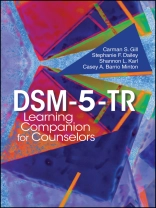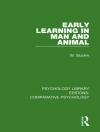This updated learning companion is designed to assist professional counselors with a smooth transition from the DSM-5 to the DSM-5-TR. The text highlights diagnostic changes and new developments within the DSM-5-TR. Each chapter features updated research with implications for evidence-based alongside practical strategies for holistic, culturally-responsive, and wellness-based counseling.
As with the original DSM-5 Learning Companion for Counselors, this revision is intended for counselors, counseling students, counselor educators, and mental health professionals who engage in mental health diagnosis and evidenced-based services. The DSM-5-TR includes some important changes of which counselors must be aware, and this updated learning companion will help them incorporate these changes into practice. This new edition addresses these noteworthy changes specifically, delineating the differences and guidance, as well as case examples.
To purchase print copies, please visit the ACA Store.
Reproduction requests for material from books published by ACA or any other questions about ACA Publications should be directed to [email protected] .
ACA no longer provides complimentary print desk copies. Digital evaluation copies may be requested from Wiley by clicking the link above and completing the details about your institution and course.
Table of Content
Foreword xiii
Acknowledgments xv
About the Authors xvii
Chapter 1 Introduction and Overview 1
Chapter 2 Structural and Philosophical Changes to the DSM: A Historical Overview 9
Part One Clinical Utility and Practice Implications for Counselors
Chapter 3 Sociocultural Issues in Diagnosis in the DSM-5-TR 39 Sociocultural Considerations and the DSM-5-TR 39
Chapter 4 Culturally Responsive Case Conceptualization and Treatment Planning: Cultural Formulation 51
Chapter 5 Practice Implications for Counselors 61
Part Two Changes and Implications Involving Mood, Anxiety, and Stressor-Related Concerns
Chapter 6 Depressive Disorders 79
Chapter 7 Bipolar and Related Disorders 101
Chapter 8 Anxiety Disorders 119
Chapter 9 Obsessive-Compulsive and Related Disorders 137
Chapter 10 Trauma- and Stressor-Related Disorders 161
Chapter 11 Gender Dysphoria in Children, Adolescents, and Adults 185
Part Three Changes and Implications Involving Addictive, Impulse-Control, and Specific Behavior-Related Concerns
Chapter 12 Substance-Related and Addictive Disorders 219
Chapter 13 Disruptive, Impulse-Control, and Conduct Disorders 233
Chapter 14 Personality Disorders 247
Chapter 15 Specific Behavioral Disruptions 285
Part Four Changes and Implications Involving Diagnoses Commonly Made by Other Professionals
Chapter 16 Neurodevelopmental and Neurocognitive Disorders 339
Chapter 17 Schizophrenia Spectrum and Other Psychotic Disorders 355
Chapter 18 Dissociative Disorders 367
Chapter 19 Somatic Symptom and Related Disorders 375
References 383
Index 389
About the author
Carman S. Gill, Ph D, LPC, NCC, ACS, is a professor and department chair at Florida Atlantic University. She has worked with client populations including individuals who are dually diagnosed, individuals with chronic mental illness, children, and individuals experiencing acute mental health crises. Her research focus includes wellness and women’s issues, as well as spirituality and religion in counseling. Dr. Gill is a past-president of ASERVIC and has served that organization as conference cochair twice, as well as newsletter editor, member of the board of directors, and secretary. Dr. Gill has coauthored multiple peerreviewed journal articles on spiritual topics. She has coedited a book on spirituality and religion in counseling, in addition to the previous version of this Learning Companion. Dr. Gill lives in Delray Beach, Florida, and enjoys going to the beach and watching Manchester United matches.
Stephanie F. Dailey, Ed D, LPC, NCC, is a licensed professional counselor and assistant professor of counseling at George Mason University. Dr. Dailey’s research and clinical work is directed at better understanding trauma-informed response protocols for mass casualty events, increasing resilience in first responders, and working with individuals diagnosed with severe mental illness and complex trauma. Her work at the federal level has included trauma-informed mitigation protocols for public schools during active shooter events, officer wellness programs aimed at improving use-of-force decision-making, and stress inoculation training to increase resilience in military medical providers. Dr. Dailey also coleads a national school-based program to address current K-12 school shooter vulnerabilities. She has published and presented extensively on the Diagnostic and Statistical Manual of Mental Disorders, counseling assessment, and case conceptualization. Dr. Dailey is a former cochair of the American Counseling Association Ethics Committee (2013-2015); a past-president of the Association for Spiritual, Ethical, and Religious Values in Counseling (ASERVIC, 2016-2017); and former chair of the American Counseling Association Foundation (2020-2023). Dr. Dailey lives in Arlington, Virginia, with her partner, their two sons (ages 8 and 10), and a loyal, yet cantankerous rescue dog. When she is not teaching, working with clients, or engaging in research, she loves spending time with her family and friends.
Shannon L. Karl, Ph D, LMHC, NCC, CCMHC, ACS, is a professor in the College of Psychology at Nova Southeastern University. She has extensive clinical mental health experience and is a licensed mental health counselor and qualified clinical supervisor in the state of Florida. Dr. Karl has published in the areas of eating disorders, domestic violence, counseling student performance, spirituality, addictions, and the Diagnostic and Statistical Manual of Mental Disorders. She is a past-president of ASERVIC and past-secretary of the Association for Counselor Education and Supervision. She frequently presents at regional, national, and international conferences and serves as a longtime team lead at the Council for Accreditation of Counseling and Related Educational Programs. Dr. Karl enjoys travel, running, and spending time with family and friends.
Casey A. Barrio Minton, Ph D, NCC, is a professor of counselor education and interim head of the Department of Educational Psychology and Counseling at the University of Tennessee, Knoxville. Her scholarly work focuses on crisis intervention, clinical mental health issues, and professionalization through teaching and leadership. Founding editor of the Journal of Counselor Leadership and Advocacy, Dr. Barrio Minton is a past-president of Chi Sigma Iota International, the Association for Assessment and Research in Counseling, the Southern Association for Counselor Education and Supervision, and the Association for Counselor Education and Supervision. She continues to actively serve these organizations through their mentorship programs and committees. She is a fellow of the American Counseling Association. Dr. Barrio Minton enjoys spending time outdoors, exploring new food and drink, and setting running goals just out of reach.












